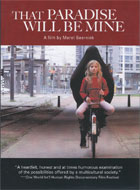
That Paradise Will Be Mine 2005
Distributed by Women Make Movies, 462 Broadway, New York, NY 10013; 212-925-0606
Produced by The Netherlands
Directed by Merel Beernink
DVD, color, 50 min.
Sr. High - Adult
Religious Studies, Sociology, Women's Studies
Date Entered: 10/27/2006
Reviewed by Michael A. LaMagna, Reference Librarian, Cabrini College, Radnor, PAEuropean Muslims are receiving considerable attention as news headlines continue to discuss their discontent. That Paradise Will Be Mine explores a small, overlooked group within the European Muslim population. Exploring the daily life of three Dutch women, Astrid, Inge, and Rabia, and how their conversion to Islam has impacted their view of Danish life, family life, and the conflict of being a Muslim woman raised Dutch. All three women spend considerable amount of time discussing dating, marriage, homosexuality, and the conflict of how their upbringing is sometimes at odds with the Islamic faith. The majority of the documentary centers on the institution of marriage. Inge is preparing for her wedding and relocation from the Netherlands to Egypt. Astrid discusses the difficulties with her first marriage and how she plans to address these difficulties when she remarries. Rabia explores how her relationship brought her into the Islamic faith. What becomes apparent is how their new faith is creating a conflict within their non-Muslim family.
This division between their faith and their family is immediately apparent when their family begins to discuss how their daughter’s conversion to Islam has impacted their relationship. Astrid discusses how her first marriage had taken her away from her family as Inge prepared to move to Egypt. As both sets of parents discuss their daughters’ conversion, it becomes apparent that they, as non-Muslims, were not accepted by the new Muslim family. This division becomes even more obvious as Rabia’s mother discusses how her grandson questions why she was not living in observance of the Islamic faith.
All three women discuss the challenges of their new faith considering their upbringing. Astrid discusses how the next time she gets married she will demand her husband accept her parents and respects the fact that they are not Muslim. Rabia discusses how even though she is accepting of her lesbian sister, she would not be accepting of any of her sons if they were gay, because it is against Islamic law.
This excellent documentary explores a topic that has to this point received little attention. The cultural conflicts that exist among European converts to Islam allows for a better understanding of how the West can co-exist with Islam. The documentary is in Dutch with English subtitles. The sound and video quality are excellent. Recommended for academic and public libraries.